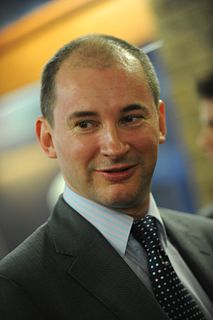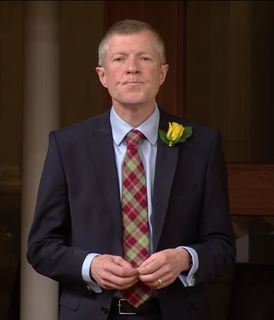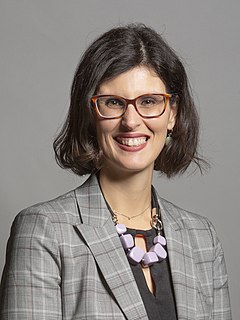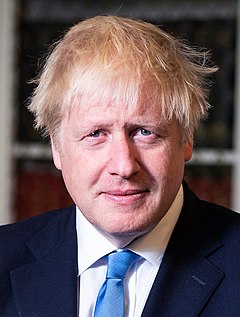
The United Kingdom is a unitary state with devolution that is governed within the framework of a parliamentary democracy under a constitutional monarchy in which the monarch, currently Queen Elizabeth II, is the head of state while the Prime Minister of the United Kingdom, currently Boris Johnson, is the head of government. Executive power is exercised by the British government, on behalf of and by the consent of the monarch, and the devolved governments of Scotland, Wales and Northern Ireland. Legislative power is vested in the two chambers of the Parliament of the United Kingdom, the House of Commons and the House of Lords, as well as in the Scottish and Welsh parliaments and the Northern Ireland Assembly. The judiciary is independent of the executive and the legislature. The highest court is the Supreme Court of the United Kingdom.

Lembit Öpik is a British former politician. A member of the Liberal Democrats, he served as the Member of Parliament (MP) for the constituency of Montgomeryshire in Wales from 1997 until he lost his seat at the 2010 general election. He was the leader of the Welsh Liberal Democrats from 2001 to 2007.

Sir Norman Peter Lamb is a British Liberal Democrat politician and solicitor. He was the Member of Parliament for North Norfolk from 2001 to 2019 and chair of the Science and Technology Select Committee from 2017 to 2019.

Sir Nicholas William Peter Clegg is a British media executive and former politician who has been Vice-President for Global Affairs and Communications at Facebook since 2018, having previously served as Deputy Prime Minister of the United Kingdom from 2010 to 2015 and as Leader of the Liberal Democrats from 2007 to 2015. He was Member of Parliament (MP) for Sheffield Hallam from 2005 to 2017. An "Orange Book" liberal, he has been associated with both socially liberal and economically liberal policies.

Stephen Roy Williams is a British Liberal Democrat politician who served as Member of Parliament (MP) for Bristol West from the 2005 general election until his defeat by Labour Party candidate Thangam Debbonaire in 2015. As an MP, he served in the Cameron–Clegg coalition government as Parliamentary Under-Secretary of State in the Department of Communities and Local Government from 2013 to 2015.

The 2005 United Kingdom general election was held on Thursday 5 May 2005, to elect 646 members to the House of Commons. The Labour Party, led by Tony Blair, won its third consecutive victory, with Blair becoming the only Labour leader beside Harold Wilson to form three majority governments. However, its majority fell to 66 seats compared to the 167-seat majority it had won four years before. This was the first time the Labour Party had won a third consecutive election. As of 2020, it remains the last general election victory for the Labour Party and was also the last general election until 2019 that a single political party would manage to achieve a large overall majority over all other parties.

Sir Daniel Grian Alexander is a British banker who is vice president and corporate secretary at the Asian Infrastructure Investment Bank. He was a Liberal Democrat politician who was Chief Secretary to the Treasury between 2010 and 2015. He was the Member of Parliament (MP) for the Inverness, Nairn, Badenoch & Strathspey constituency from 2005 until the general election in May 2015, when he was defeated by Drew Hendry of the Scottish National Party (SNP). In his first parliamentary term (2005–2010), Alexander was the Liberal Democrat spokesperson for Work and Pensions (2007–2008), the Chief of Staff to party leader Nick Clegg, and Chair of the Liberal Democrat Manifesto Group (2007–2010).

The 2010 United Kingdom general election was held on Thursday 6 May 2010, with 45,597,461 registered voters entitled to vote to elect members to the House of Commons. The election took place in 650 constituencies across the United Kingdom under the first-past-the-post system. The election resulted in a large swing to the Conservative Party similar to that seen in 1979; the Labour Party lost the 66-seat majority it had previously enjoyed, but no party achieved the 326 seats needed for a majority. The Conservatives, led by David Cameron, won the most votes and seats, but still fell 20 seats short. This resulted in a hung parliament where no party was able to command a majority in the House of Commons. This was only the second general election since the Second World War to return a hung parliament, the first being the February 1974 election. However, a hung parliament was anticipated this time, so politicians and voters were better prepared for the constitutional process that would follow such a result. The coalition government that was subsequently formed was the first to eventuate directly from a UK election. The hung parliament came about in spite of the Conservatives managing both a higher vote total and a higher share of the vote than the previous Labour government had done in 2005, when it secured a comfortable majority. A total of 149 sitting MPs stood down at the election, the highest since 1945, including many former New Labour Cabinet ministers such as former Deputy Prime Minister John Prescott, Alan Milburn, Geoff Hoon, Ruth Kelly, James Purnell and John Reid. One reason for the very high number of MPs standing down was the parliamentary expenses scandal a year earlier.

Joanne Kate Swinson is a British Liberal Democrat politician who served as Leader of the Liberal Democrats from 22 July to 13 December 2019. She was the first woman and the youngest person to hold the position. Swinson served as the Member of Parliament (MP) for East Dunbartonshire from 2005 to 2015 and 2017 to 2019.

Martin Charles Horwood is a British Liberal Democrat politician who represented South West England in the European Parliament from 2019 to 2020. He previously served as the Member of Parliament for Cheltenham from 2005 to 2015.

William Cowan Rennie, also known as Willie Rennie, is a Scottish politician serving as Leader of the Scottish Liberal Democrats since 2011. He has served as the Member of the Scottish Parliament (MSP) for North East Fife since 2016, and previously as MSP for Mid Scotland and Fife and as Member of Parliament (MP) for Dunfermline and West Fife.

The Liberal Democrats are a liberal political party in the United Kingdom. The party has 11 Members of Parliament in the House of Commons, 89 members of the House of Lords, five Members of the Scottish Parliament and one member in both the Welsh Parliament and the London Assembly. It formed a UK coalition government with the Conservative Party from 2010 to 2015. In devolved governments, the Liberal Democrats are in coalition with Welsh Labour in the devolved Welsh government, and also served as the junior partner with Scottish Labour in the Scottish Government from 1999 to 2007.
The Browne Review or Independent Review of Higher Education Funding and Student Finance was a review to consider the future direction of higher education funding in England.

Charles Peter Kennedy was a British Liberal Democrat politician who was Leader of the Liberal Democrats from 1999 to 2006, and a Member of Parliament (MP) from 1983 to 2015.

Layla Michelle Moran is a British Liberal Democrat politician serving as the Liberal Democrat Spokesman for Foreign Affairs and International Development since 2020, and serving as the Member of Parliament for Oxford West and Abingdon since 2017. She identifies as pansexual and is believed to be the first UK parliamentarian to come out as pansexual. She is the first MP of Palestinian descent.

Samuel Phillip Gyimah is a British politician who served as the Member of Parliament (MP) for East Surrey from 2010 to 2019. First elected as a Conservative, Gyimah rebelled against the government to block a no-deal Brexit and had the Conservative whip removed in September 2019. He subsequently joined the Liberal Democrats and stood unsuccessfully for them in Kensington at the 2019 general election.

William James Quince is a British Conservative Party politician and former lawyer. He was first elected at the 2015 general election as the Member of Parliament (MP) for Colchester, replacing the incumbent Liberal Democrat MP Sir Bob Russell. From 2011 to 2016, Quince was a borough councillor for Prettygate ward in Colchester.

The 2019 United Kingdom general election was held on Thursday, 12 December 2019. The Conservative Party, having failed to obtain a majority in the 2017 general election, had faced prolonged parliamentary deadlock over Brexit while it governed in minority with the support of the Democratic Unionist Party (DUP), a situation which had forced the resignation of the previous Prime Minister, Theresa May.

The 2019 Liberal Democrats leadership election was held following the announcement of the resignation of Vince Cable as leader on 24 May 2019, after just under two years as leader of the Liberal Democrats in the United Kingdom. The two candidates to succeed Cable were Ed Davey and Jo Swinson.

The 2020 Liberal Democrats leadership election was held in August 2020, after Jo Swinson, the previous leader of the Liberal Democrats, lost her seat in the 2019 general election. It was initially set to be held in July 2020, but due to the COVID-19 pandemic it was delayed by six weeks, having been at first postponed until May 2021.

















